Prayer for the Living Read online
Page 6
‘I’m tired, Dad,’ Uri said. ‘Can I have a Fanta?’
‘You will all have Fanta when we get home. First we have to get the car to start.’
We stood around. Uri had his arms crossed. Essay stared at the boys who were watching us.
‘Why are they looking at us like that? WHAT ARE YOU LOOKING AT?’ he shouted.
All along the road those who hadn’t noticed us before noticed us now. More eyes watched us and Essay went and sat in the back seat of the car.
‘What are we going to do, Dad?’ he asked.
‘We are going to get this thing moving.’
‘How? No one will help us. All they do is look.’
‘People always look. When you are in trouble, they look. People like looking. Don’t let it worry you. It’s what you do that counts, not whether they are looking.’
‘But why don’t they help?’
‘People never help when you need them.’
‘When do they help?’
‘When you don’t need them.’
‘But that’s bad, isn’t it?’
‘That is the world, Essay. When you don’t need them, they will rush to help. When you need them, they are never there.’
‘Why is the world like that?’
‘I don’t know.’
‘What can we do?’
‘You must learn to do things for yourself. Don’t rely on others, or they will let you down.’
‘What do we do now?’
‘We push.’
‘Just us?’
‘Yes. We push as if we are the only ones left in the world.’
‘Okay, Dad.’
Essay got out from the back seat. We both began to push. Essay groaned and shouted as he pushed. We both heaved and put our backs to it and drove our feet into the ground and the metal of the car burned our backs. We dashed our rage against the heft of the car. Then slowly the earth shifted beneath our feet.
Uri joined us and he too was heaving. Dad got out and pushed from the open door and we got the car moving a little. We kept on, shoving and getting up a run. Dad urged us on. We went past the Coca-Cola kiosk, the tyre-sellers, the barbers, and the hotel where the prostitutes sat in the shade fanning themselves.
The car was rolling along now and we kept up the run. Dad delayed getting into the car. He urged us to go faster and faster. We were not tired anymore. The car was on the move. Before we knew it we had to jam up closer to one another because all of a sudden several hands had joined in the pushing. We got up a big momentum and the engine growled and cranked into life. The exhaust coughed, and the car sped away from us, and we were left running along the road with only the air in front of us.
When we ran to catch up with the car we saw a crowd of men and boys and little girls with us. They were all smiling. Before we could thank them they melted back to the roadside, to their kiosks and their trades and their loafing. Only a little boy in ragged shorts stood there in the middle of the road waving at us.
Dad eased into gear, and drove us home.
Hail
I was at the framers. It was a cold day with a wan light in the sky. I had come in from the cold because I wanted frames for my pictures. I’d been thinking about this for a long time.
I had been walking down the street when I saw the heavy stack of Victorian frames neatly arranged in the shop. I had made a good find.
My daughter was asleep in her soft lamb’s wool blanket. My girlfriend had stopped in a shop to buy some honey. I stood in the warmth of the framer’s shop looking out of the big window. I wanted to surprise my girlfriend when she came hurrying out of the honey shop. I waited for a long time.
The framer was busy with a couple. They were taking quite some time buying a light wood frame and some nails and grips. The young man talked volubly to the framer while I waited. Then my girlfriend went past with an anxious look. She could not see me or the pram along the road.
Then she caught a glimpse of me in the framer’s window and smiled and came in. We waited patiently together. The young man began telling a long story about an aunt who found a painting in the attic. The framer was very obliging in the way he listened. We stood there a long time and the light in the sky darkened a little.
I had my back to the couple. My girlfriend was looking out of the window. That was when I heard the young man’s girlfriend say:
‘George, how many paintings have you sold?’
‘Five hundred,’ he said.
‘Five hundred?’ said the framer.
‘Five hundred,’ said the young man.
‘That’s a lot of paintings,’ said the girlfriend.
‘Five hundred,’ said the young man, ‘and then I gave up.’
‘You gave up? Why did you give up?’
‘It’s complicated. I was getting depressed. It was very hard. I got seriously depressed.’
‘But still, five hundred paintings!’
‘I was getting very seriously depressed. It was hard.’
‘Very odd that you gave up after selling five hundred paintings.’
‘Not really. I was depressed. I was worse than depressed.’
There was a pause. They were silent. It began to rain outside. You could hear the patter of rain on the window. It was as if someone dimmed the light of the sun.
‘All the painters I met who are in their sixties look terrible. They’re all a mess. They are the unhappiest-looking people I know,’ said the young man.
He paused.
‘I got unbelievably depressed,’ he added.
I looked at him. He didn’t look very depressed now. Though you never can tell. He was buying a cheap frame not for a work he had acquired, but for a painting his girlfriend’s mother had found in her basement. They’d had it valued, but it wasn’t worth anything at all. They were having it framed anyway.
The framer was very helpful. He offered to carry the frame to the car, but they wouldn’t let him.
I caught another glimpse of the young man as they went past the big window. He didn’t look depressed. He had a careful three-day growth of beard. His beard was not depressed either. But you never can tell.
We watched the hail drumming down on the pavement.
Mysteries
‘Do you know we have two bodies?’ said the poet.
‘Two bodies?’
‘One visible, the other invisible.’
They were sitting in a restaurant, waiting to be photographed for a charity event in a theatre. The actor turned to the poet and registered his existence. It was as if he had been invisible and his utterance had rendered him visible.
‘How so?’
‘Think of the amputee.’
‘What about the amputee?’
‘They feel the missing limb.’
‘There is a scientific explanation for that. Something to do with nerve endings.’
‘The invisible limb outlasts the visible one.’
‘But does it feel?’
‘If we have two bodies, it follows that we have two brains.’
‘Two brains?’
‘The visible limb feels through the visible brain, and the invisible limb feels through the invisible brain.’
The actor stared at him sceptically.
‘The invisible brain could rightly be called the mind.’
‘Where do you get these ideas from?’
The poet shrugged. The shrug intrigued the actor.
Next to them was an English novelist. She had been paying keen attention to their conversation. Her next novel was going to be about life and death.
The play they would be seeing was about Mahler’s conversion from Judaism to Christianity. He had converted to get the job as senior conductor in Vienna. The performance was for a charity event. The photographer appeared and the invited guests gathered for the photographs that would help draw attention to the charity event. The conversation passed on to more pragmatic things.
The next time the poet saw the actor was at the charity event itsel
f, which took place after the performance of the play. The production, a little bare, was enjoyed by the poet. The novelist walked out of the play before the interval.
Most of the guests did not enjoy the play as much as the poet did. His taste in these matters was relaxed. He appreciated the trouble people took to create something and never allowed himself to become snobbish. If he was diverted, stimulated, and delighted a little, if there was some humour in the work, some profundity, he was generally contented. He felt that too much shouldn’t be asked of living artists. Too much straining and they make life dull.
He spoke to several people at the party. He had a lively moment with a Jewish couple talking about their favourite play of the twentieth century, which was Arthur Miller’s The Crucible.
‘Why?’ he asked the man.
The man shrugged.
‘Great metaphor,’ he said. ‘And you, what do you choose?’
‘The Cherry Orchard,’ the poet replied.
‘Why?’
‘Its deceptive transparency.’
‘Is that all?’
‘No.’
‘What else?’
‘Its perfect poetic narrative and the mysterious parable at its heart.’
‘Good reasons,’ the woman said.
Not long afterwards he met the elderly actor again. They exchanged greetings warmly.
‘I might have a part for you in a play of mine,’ the poet said.
‘You have a play?’
‘It’s been maturing in my cupboard for twenty years.’
The elderly actor seemed surprised, and said:
‘Would you like to come and see my play?’
‘Your play?’ the poet said.
‘One I’m directing.’
‘I’d be delighted.’
‘I’ll give you a call to fix tickets and arrange a date,’ the elderly actor said, before leaving.
*
A week passed. The actor called and arranged the ticket for a Wednesday. This was later cancelled because it was press night. The actor said he found press nights stressful. A few days later the actor fixed the ticket for the following Wednesday. He suggested dinner afterwards.
‘Is it okay if I bring my partner?’ the poet said.
‘Absolutely.’
On the day itself the actor and the poet were late, but the partner was early. It was a time when the world was uneasy with the war in Afghanistan. In response to the destruction of the Twin Towers, America was dropping bombs on Kabul. The world felt raw and dangerous, perched on the edge of a world war that could drag on indefinitely. People feared terrorist attacks on major western cities would paralyse their lives. It was a strange time, the firebirth of a new century.
It was in this nervous world atmosphere that they gathered at the Court Theatre bar. They had a drink and went up to see the play. It was a series of three monologues. It had only two characters. The experience was uncomfortable, but the play was not without some feeling. After the play they converged downstairs for another quick drink, and went to dinner at Como Lario.
Dinner was delightful. Their host, the elderly actor, was pleasant and charming. He was a good listener, a careful cultivator of his energies, and a Scot, as it turned out. He had been fortunate to find fame late in life, when his character was already formed and his mind unassailable. This made him comfortable to be with. He was a pragmatist who enjoyed a good laugh.
The two tables next to them were occupied by young stockbrokers who talked loudly and were brash in their jokes. The actor scowled at them during dinner.
At their table they talked about many things. They talked about their childhoods, about once famous plays that were deserting the world like reproachful friends. They talked about shows they had liked or hated. They talked about directors who were in fashion, actors falling out of favour, and of the absence of courage in many new plays being written. But they didn’t talk about mysteries.
‘Tell me about your play?’
The poet spoke briefly and shyly about the play he had written, and which he felt had a special role for the actor.
‘When can I read it?’
‘It needs a bit of work. Maybe in a month or two?’
‘I’d love to read it whenever you are ready.’
Dinner came to an end with cappuccino and teas. The actor paid the bill, left a generous tip, and gave the noisy young things at the next table his signal scowl. Then they went out into the chilly October night.
‘Can I give you a lift?’ he asked, hailing a taxi.
‘Thank you, but we’ll walk for a bit.’
‘Are you sure?’
‘Yes. Thank you.’
‘It’s no trouble.’
‘That’s kind of you, but we’ll be fine.’
They said their goodbyes. The actor climbed into the taxi, and left.
*
They had declined the offer of a lift because they wanted to walk. They loved walking. The poet and his girlfriend, who was a painter, walked everywhere they could. They loved the conversations that walking yields.
It had rained, the pavements were wet, and a strong wind was blowing. The streets were quiet and the air was fresh. They wanted to walk for a while, and then catch a late bus home.
They went down a side street, talking about the play. They hadn’t liked it much, but they really liked the actor. Events of the day filtered through their conversation, along with incidental shafts of philosophy and speculation. They came to a bus stop. They were far from their normal bus routes. They waited in the dark for a bus that might take them close to home. The streets were still and silent after the rain.
They were waiting patiently when a slick black car appeared, like an apparition, in front of them. It had slid out of nowhere, quietly, suddenly. It had glided into their space. A smooth, handsome young man was at the wheel. There was something sinister about him which they could not place. The front-seat window came down silently. The man at the wheel looked at them without speaking.
At that same moment, along the deserted street, a bouncer in a nightclub stepped out into the lighted doorway and became visible. He was thickset in a black suit and a white shirt. He turned and looked in their direction.
Then the young man spoke.
‘Sloane Street?’ he said.
He was European, German or Italian.
‘I don’t know where that is,’ the poet’s girlfriend said.
‘We’re not from around here,’ said the poet.
‘Sloane Street?’ the man in the car asked again.
‘Ask that chap,’ the poet said, pointing at the bouncer.
The sinister young man in the slick car did not look in the direction indicated. He lingered. He waited. He watched the two of them. He smiled in a curious way. There was something odd about the way he held his head, something unfathomable about the dark light in his eyes. He waited much longer than he needed to. It was as if he wanted something, or as if he were giving them a chance to want something from him.
Then the girlfriend stepped forward and said:
‘Try someone else.’
That broke the spell. The car glided away as mysteriously as it had appeared. They didn’t really see it go. It just disappeared, and they moved on to other thoughts. It was only later that it gained significance.
They stood there for some time in the car’s wake. The sudden pointlessness of everything swept over them. They felt restless and a malaise crept into them.
‘What are we waiting for?’ the poet wondered aloud.
‘Nothing,’ the painter said. ‘Let’s walk.’
‘Yes.’
‘The air is good.’
They walked to the square. It was almost empty. They had a choice of roads to take. They looked for bus stops. It was late now. Something had pulled them there. They stood in the square for a long time. They stood there, staring at the night, at the buildings, the empty taxis, waiting for nothing.
‘Let’s walk towards Knightsbridge,’ the poe
t said.
‘Okay. It’s that way,’ his girlfriend said, pointing down a street, which she later realised was Sloane Street.
‘No, let’s go down this street,’ the poet said, indicating the street just ahead of them. ‘That street looks uninteresting at this hour.’
‘Maybe this is not its hour.’
‘This one ahead looks more alive.’
They crossed the road. It was a clear and fine night. The wind was warm. There was a perfect mood in the air. Harmony dwelled between the poet and his girlfriend. She was happy. She loved the wandering mood they were in. It reminded her of an Italian holiday, roaming in a strange little town at night, with a sense of wonder and romance.
They came to a bus stop and found that one of the buses could take them in a homeward direction. They stood there a while. Walking was their original aim, but there they were again lingering at that bus stop. That was the poet’s doing. He was just standing there, feeling and not knowing what he felt. He had a sense that there was something he should be aware of, something he should be seeing. He looked in the distance and saw a red double-decker bus far away, close to where they had been. He said nothing. This numinous feeling filled his being.
They were both silent. He gazed at the stars, at the night sky, not thinking.
Then she said:
‘C1.’
The poet looked down. He had heard her say:
‘See one.’
Then he saw the bus. It was a single-decker bus, with the legend ‘C1’ on its destination panel. The poet said:
‘I see two.’
‘C1,’ she said again.
‘I see two buses,’ the poet said, trying to be witty, but the original phrase he had heard still echoed in his mind.
The C1 bus stopped before them. Its door swung open. Its driver was African. A passenger stepped in, and the bus drove off.
The second bus the poet had seen stood at the same spot, far away, at a junction in Sloane Square. It stood there, red in the night, for a long time. They both stared. A gentle breeze blew their minds to other distractions. Suddenly the poet heard her words like a spell opening up the night.
‘Look at that church!’
A little alarmed, the poet looked and saw the church. It was strange, out of place, beautiful. It belonged in some quaint Italian town. Something stumbled upon as you wandered at night in a strange city, senses open to wonder.

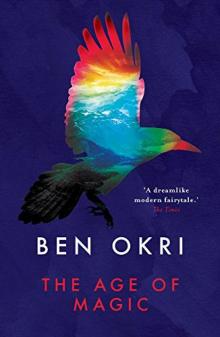 The Age of Magic
The Age of Magic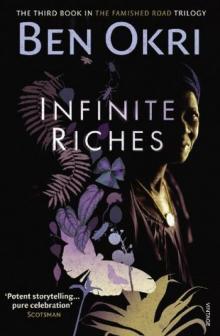 Infinite Riches
Infinite Riches Songs of Enchantment
Songs of Enchantment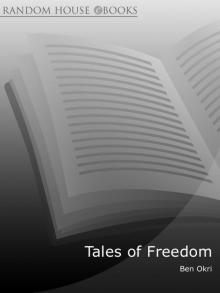 Tales of Freedom
Tales of Freedom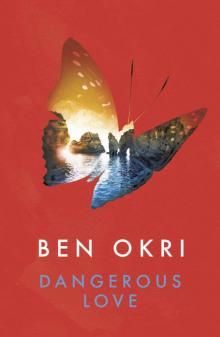 Dangerous Love
Dangerous Love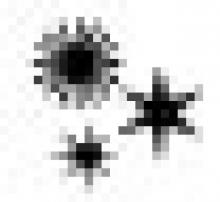 Starbook
Starbook The Famished Road
The Famished Road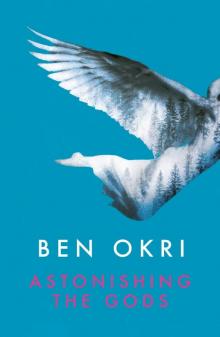 Astonishing the Gods
Astonishing the Gods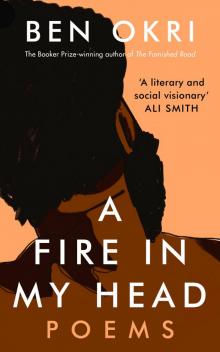 A Fire in My Head
A Fire in My Head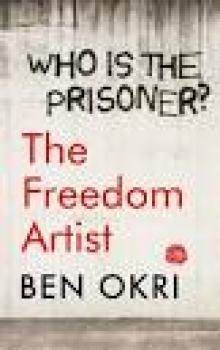 The Freedom Artist
The Freedom Artist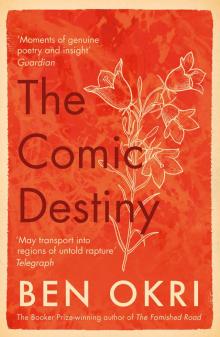 The Comic Destiny
The Comic Destiny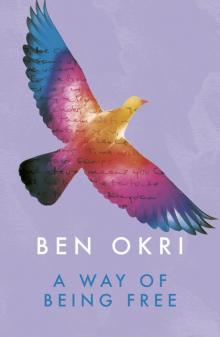 A Way of Being Free
A Way of Being Free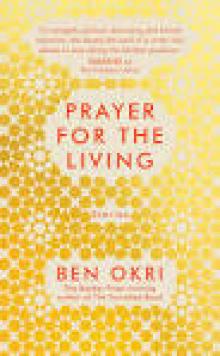 Prayer for the Living
Prayer for the Living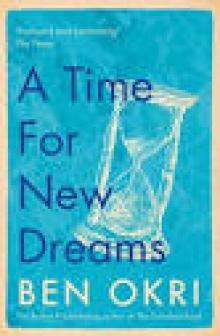 A Time for New Dreams
A Time for New Dreams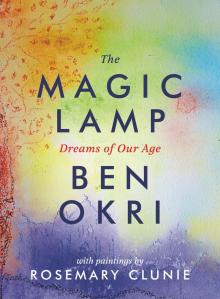 The Magic Lamp
The Magic Lamp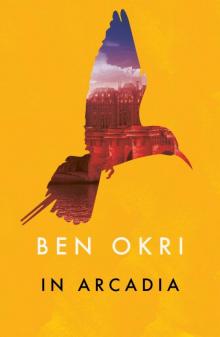 In Arcadia
In Arcadia